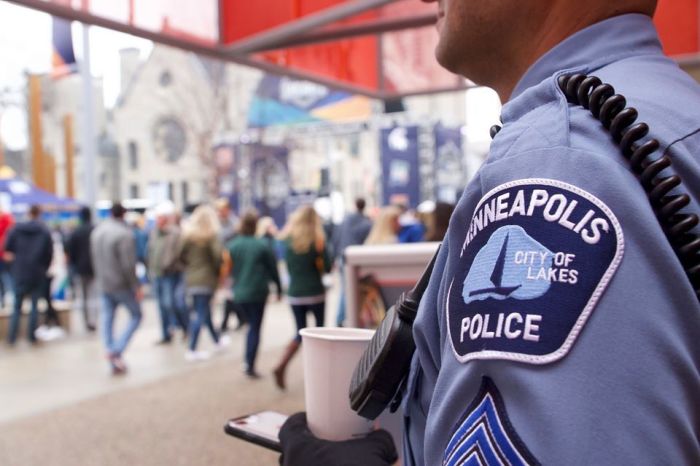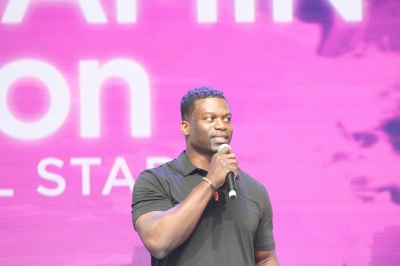Over 20 Christian groups and leaders seek police accountability, reform in new campaign
Initative backed by NAE, NHCLC, Prison Fellowship, Church of God in Christ and a retired NFL star

Three months after the death of George Floyd, over 20 Christian organizations and figures representing diverse communities of believers have joined an “unprecedented” nonpartisan coalition to advocate for police accountability reforms at the federal, state and local levels.
On Wednesday, the Prayer & Action Justice Initiative was launched as part of an effort spearheaded by the national urban Christian civil society organization the AND Campaign, which seeks to bring social justice and moral convictions of the Gospel to American politics.
The initiative brings together Christian organizations and bodies that represent thousands of churches nationwide attended by millions of diverse believers, who will be urged to do their parts to push for justice reform within their localities and spheres of influence.
“We mourn the loss of Breonna Taylor, Ahmaud Arbery, George Floyd and all others who have lost their lives due to racialized violence,” a joint statement signed by Christian leaders and organizations reads. “The Church must take these injustices personally, and take initiative to expel racial hatred and partiality from our society.”
Partners in the initiative include the nation’s largest evangelical prison ministry Prison Fellowship, the 12,000-congregation Church of God in Christ denomination, the 45,000-church National Association of Evangelicals, the 34,000-church National Hispanic Christian Leadership Conference and the Asian American Christian Collaborative.
Other partners include the American Bible Society, the National Day of Prayer Task Force, Nick Hall’s Pulse Movement and the Center for Public Justice, among others.
The coalition is supported by Rev. Samuel Rodriguez of NHCLC, who gave an invocation at President Donald Trump’s inauguration in 2017; as well as Rev. Gabriel Salguero, president of the National Latino Evangelical Coalition, who offered an invocation on the opening night of the Democratic National Convention this week.
Also joining the campaign is former Obama campaign faith adviser Michael Wear and retired National Football League tight end and outspoken Christian Benjamin Watson, author of the 2015 book Under Our Skin: Getting Real about Race — And Getting Free from the Fears and Frustrations that Divide Us.
It has been over 85 days since Floyd, a 46-year-old African American, was killed in Minneapolis police custody. His death along with those of Taylor and Arbery sparked nationwide protests and calls for police accountability reform.
However, negotiations on police and criminal justice reform in Congress stalled despite earlier proposals from Democrats in the House and Republicans in the Senate.

“This is somewhat unprecedented when it comes to a coalition of Christian organizations, pastors, leaders who are coalescing for a common cause,” said Watson, a 39-year-old father of seven who retired this year after playing more than 15 seasons in the NFL.
“We are three months after the killing of George Floyd. All the other deaths that have happened and the reactions that we have seen in the streets protesting, it is an outcry from our nation collectively but also from the body of Christ.”
Watson, who is focusing on spending time with his family and advocacy work in his post-football life, told The Christian Post that the PAJI initiative is about encouraging organizations and pastors to get their congregations to take action by getting involved in the legislative process and having conversations with district attorneys' offices.
“We believe that as the Church goes, the nation goes,” he said. “Faith without works is dead. We know that and believe that on so many issues, such as sex trafficking. … When it comes to racism and injustice in our political system, many times it is difficult or we turn a blind eye.”
He warned that the country can’t “leave this time unchanged.”
“There is a fear that we will be having the same conversation five years from now, just like we were five years ago and five years and 10 years before that,” Watson said. “The groundswell in this time has a different feel to it. As believers, justice is taking on the perspective and the lens of those who are at the forefront of leading it, whether that’s right or wrong. The point here is to say that Christians got to engage. They have to speak truthfully about what justice truly is.
“As a church, the stigma is that we are always late to the party when it comes to race issues, specifically the white evangelical church. I will tell you, I have heard so much from my white evangelical friends that they want to be involved with this. This is an opportunity to do so from a leadership standpoint and challenging those in your pews to say, ‘We need to take substantive steps to engage and to change the things that are wrong.’”
Through the initiative, advocates will push for the enacting of laws and policies that focus on five areas of concern to help advance racial justice and create more accountability and transparency for police officers who violate the rights of individuals. Those five areas are equality, accountability, transparency, proportionality and restoration.
The initiative calls on police departments to limit the use of force to “proportionate measures.”
“We seek laws, regulations and practices that enhance transparency in all aspects of the criminal justice system, including open file discovery for criminal cases, and robust reporting on law enforcement, judiciary, and corrections institutions, such as public disclosure of use-of-force reports, deaths in custody, parole decisions, and other relevant data,” a policy document released by the initiative reads.
Watson said that one issue that has come up a lot is “qualified immunity” for police officers, a principle that shields officers from being held personally liable for violations of justice.
“There needs to be accountability on all sides. There needs to be accountability with our laws and accountability with our law enforcement and accountability in our communities when people break the law,” he said.
“Justice should be administered in a fair way. We talk about transparency in seeking laws and practices that enhance transparency when it comes to the criminal justice system. A lot of the mistrust comes because there is not transparency when it comes to law enforcement reports, when it comes to use of force and sentencing and those sorts of things.”
The coalition wants to see laws that lead to more proportional sentencing outcomes as many on both sides of the aisle have been critical of federal mandatory minimum sentences that critics say have led to racial sentencing disparities. The initiative also seeks policies that foster more of a restoration approach to incarceration so that inmates have a better shot at a successful life after prison.
Christians are called to join or convene groups of faith leaders in their cities or regions for prayer and fellowship and commit to being leading contributors in pushing for nonpartisan criminal justice and police reform action.
Christian leaders are also asked to consider hosting things like town halls with a group of diverse churches to discuss what the future of policing will look like and to continue making their voices heard through peaceful protests.
The movement seeks to push for policies that “level the playing field so that outcomes are driven more by justice than wealth or race” and also wants laws that “require accountability for all wrongdoers, including those involved in the administration of justice, and provide opportunities to make amends.”
The initiative comes after President Donald Trump signed the bipartisan FIRST STEP Act into law in December 2018, which proponents called the most comprehensive federal prison reform bill in decades.
“This is about nonpartisan issues and understanding that we are in a very political time,” Watson, a former University of Georgia standout, told CP. “But we believe there are certain things that cross cultural and denominational lines that we should be able to stand for together in a nonpartisan way and doesn’t have anything to do with who you decide to vote for or don’t decide to vote for.”
According to Watson, the initiative will release a policy framework for some of the policy goals outlined in the initiative’s launch documents.
“In the coming weeks and months we will be rolling out more ideas when it comes to specific pieces of legislation,” he said.
Early this year, Trump signed an executive order incentivizing police departments nationwide to enact policies banning the use of chokeholds that restrict airflow and other policing reforms. Despite a stall on reform proposals, Congress last month passed a bill to create a federal commission to examine the impact of systemic racism on African Americans.




























